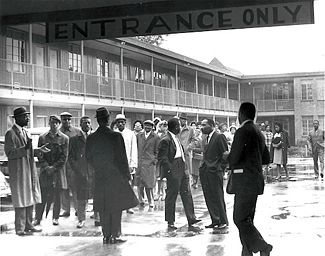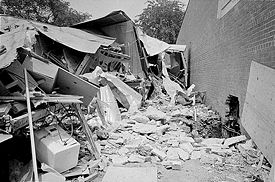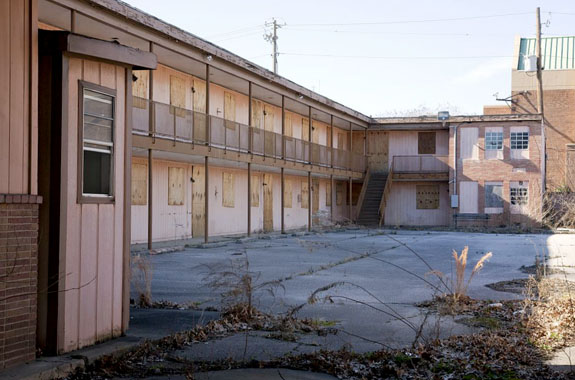A. G. Gaston Motel
The A. G. Gaston Motel is a former motel located at 1510 5th Avenue North, now part of Birmingham's "Civil Rights District". It was constructed in 1954 by businessman A. G. Gaston to provide higher-class service to black visitors during the city's decades of strictly-segregated business and recreation.
Gaston struck upon the idea of building a motel while he and his wife visited Europe for an international Methodist conference in the summer of 1951. He heard that the National Baptist Convention's Sunday School and Baptist Training Union Congress was considering Birmingham for its 1954 meeting. Knowing that African American visitors would have trouble finding adequate lodging, he set out to fill the need. After his return he studied motels, especially the successful Holiday Inn chain, which served as a model for the Gaston Motel. The building was designed by Stanley Echols of the Brooke Burnham's architectural firm and constructed by the Steel City Construction Company. Gaston exceeded the basic needs of travelers, embarking on "a real adventure in providing something fine that I believe will be appreciated by our people," as he told a Birmingham News reporter.
The Gaston Motel opened in June 1954, just in time to host guests of the National Baptist Convention. The motel had 32 guest rooms, some of which were "master suites" which could sleep up to seven guests. All rooms were heated and air-conditioned with private baths, in-room telephones, and jukeboxes. The drapes and bedspreads were custom-made and high-end furnishings were purchased from Rhodes Caroll.
The enclosed parking court terminated in a shaded patio. Off the lobby were a spacious dining room with a cocktail lounge. George Small was hired as the motel's first manager and the Gaston's own personal chef, Mamie Ruth, oversaw the kitchen.
The lounge regularly booked nationally-renowned entertainers, including Little Richard and Stevie Wonder. Notable guests at the Gaston Motel included future Secretary of State Colin Powell.
Civil Rights Movement

Because it was the city's premier black establishment, the Gaston Motel hosted countless leaders in the Southern movement for Civil Rights as they met and traveled through Birmingham. Gaston himself, though he sought meaningful long-term improvement in the treatment of blacks, strongly disagreed with plans by Fred Shuttlesworth's Alabama Christian Movement for Human Rights and the Southern Christian Leadership Conference to bring SCLC leaders to Birmingham to lead mass demonstrations. In return, some in the movement wanted to picket his motel along with the white businesses that wouldn't hire or serve blacks.
Nevertheless, Gaston often worked behind the scenes to assist with the movement and to negotiate with more moderate figures in the white business community. When Shuttlesworth did invite the SCLC leaders to the city to plan a Birmingham Campaign, they stayed and met at the Gaston Motel, even though Gaston insisted that the bill be made out to the local ACMHR.
During the Spring of 1963 King stayed in room 30, which was used as a "war room" by the movement's top leaders. It was there that he made the decision to defy a court's injunction and submit himself to being jailed as a show of solidarity with local protesters. The "Letter from Birmingham Jail" he composed laid out his philosophy of racial justice and his commitment to using non-violent demonstrations to create a crisis that could only be resolved by positive change. After a violent showdown with Public Safety Commissioner Bull Connor which triggered national outrage, it was at the Gaston Motel's courtyard where King, Abernathy and an injured Fred Shuttlesworth announced the a truce with white business leaders and city officials. On May 12, two days after the truce was signed, a pair of bombs exploded near King's room, destroying most of the motel's facade.
Later years
The Gaston Motel was part of a controversy over player housing during the Alabama Vulcans lone season in 1977. The motel closed in the late 1970s.
In 2007 St Louis, Missouri developer Michael V. Roberts announced plans to renovate the Gaston Motel as a hotel and conference center with interactive exhibits to educate visitors about its important role in black history. He asked the city for about $9 million in incentives to get the project going. In 2008 Roberts said that he was working with other investors and with Birmingham mayor Larry Langford to consider a larger redevelopment project, in which the motel would be a centerpiece.
In January 2015 The Birmingham City Council approved $10 million in public funds for redevelopment of the motel site as a "Freedom Center". A portion of the historic hotel would be preserved and restored. New buildings would function as an extension of the adjacent Birmingham Civil Rights Institute, housing additional program space along with new academic facilities. The center would be marketed as a potential home for a U.S. Institute of Human Rights.
References
- "Freedom--Now" (May 17, 1963) TIME Magazine
- McWhorter, Diane (2001) Carry Me Home: Birmingham, Alabama: the Climactic Battle of the Civil Rights Revolution New York: Simon & Schuster. ISBN 0743217721
- Bryant, Joseph D. (March 19, 2007)
- Williams, Roy L. (February 21, 2008) "Developer considers renewal plan beyond Birmingham's A.G. Gaston Motel site." The Birmingham News
- Fazio, Michael W. (2010) Landscape of Transformations: Architecture and Birmingham, Alabama. Knoxville, Tennessee: University of Tennessee Press ISBN 9781572336872
- Bryant, Joseph D. (May 30, 2013) "A.G. Gaston Motel: Civil rights era landmark a deteriorating relic overlooked in 50th anniversary fanfare." The Birmingham News
- Sutton, Marie (2014) The A. G. Gaston Motel in Birmingham: A Civil Rights Landmark. The History Press ISBN 9781626195950




